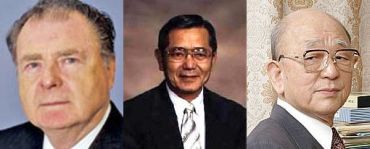 | « Back to article | Print this article |
 Japanese scientists Ei-ichi Negishi and Akira Suzuki and their American counterpart Richard F Heck have been awarded the 2010 Nobel Prize in Chemistry for the development of palladium-catalysed cross coupling.
Japanese scientists Ei-ichi Negishi and Akira Suzuki and their American counterpart Richard F Heck have been awarded the 2010 Nobel Prize in Chemistry for the development of palladium-catalysed cross coupling.
Their chemical tool has vastly improved the possibilities for chemists to create sophisticated chemicals, for example carbon-based molecules as complex as those created by nature itself.
Carbon-based (organic) chemistry is the basis of life and is responsible for numerous fascinating natural phenomena: colour in flowers, snake poison and bacteria killing substances such as penicillin. Organic chemistry has allowed man to build on nature's chemistry; making use of carbon's ability to provide a stable skeleton for functional molecules.
This has given mankind new medicines and revolutionary materials such as plastics.
In order to create these complex chemicals, chemists need to be able to join carbon atoms together.
However, carbon is stable and carbon atoms do not easily react with one another.
The first methods
Palladium-catalysed cross coupling solved that problem and provided chemists with a more precise and efficient tool to work with.
In the Heck reaction, Negishi reaction and Suzuki reaction, carbon atoms meet on a palladium atom, whereupon their proximity to one another kick-starts the chemical reaction.
Palladium-catalysed cross coupling is used in research worldwide, as well as in the commercial production of for example pharmaceuticals and molecules used in the electronics industry.
Last year's prize in chemistry went to India-born Venkatraman Ramakrishnan; Thomas A Steitz of the United States; and Ada E Yonath of Israel, for their work on how the DNA code is translated into life, findings that have been used to fight infectious disease.
Image: (From Left to Right) Richard F Heck, Ei-ichi Negishi and Akira Suzuki